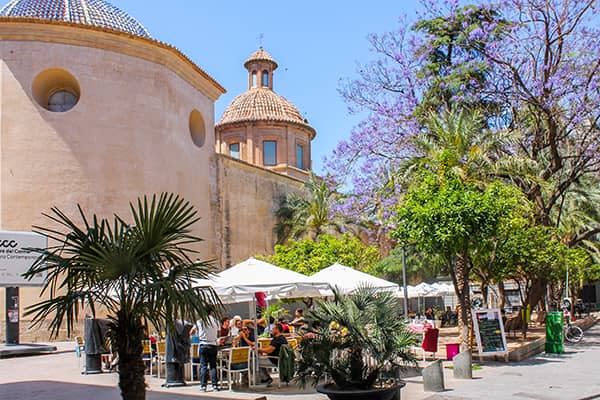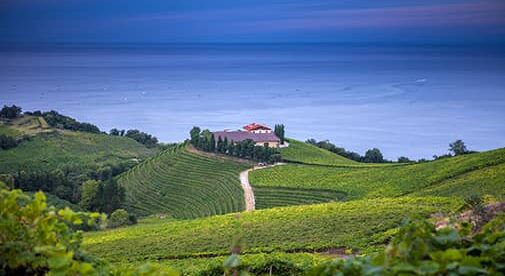Perhaps this comes as a surprise to you, but alongside its many attractions as an energetic, warm-weather, affordable European destination, Spain has the most vineyard acres of any country in the world. It is a global top-three wine producer and the world’s largest exporter. Above all, from the searing plains of Andalusia to the misty green fjords of Galicia, Spain is diverse. That variety of terrain and climate is reflected in its wines. From the unctuous sweetness of Pedro Ximénez varietal sherry to the saline savor of crisp white Albariño, Spain is a trove of endless delights for oenophiles.
And with such an extensive, and downright huge, wine industry comes opportunity. Expats who work in the wine business, or would like to, find the industry’s size and diversity make it surprisingly accessible. Finding a profitable niche in the wine industry is a dream gig, even more so if it brings you to the historic surrounds of Barcelona, Valencia, or A Coruña. If you’re already a wine buff, you probably won’t need any more inspiration, but if you need a little more encouragement, we offer you the stories of four incomers who turned their knowledge and skills into successful wine enterprises.
Mark O’Neill, Northern Ireland
Owner/WSET instructor: The Wine Place, Valencia
The Wine and Spirits Education Trust provides some of the global wine industry’s most valued and recognized credentials. When Mark O’Neill, whose background was in fruit and vegetable retail, got his first wine industry job, his employer encouraged him to complete its courses. That done, he moved to Spain to set up his own wine import/export business.
Once there, he spotted a gap in terms of wine education: “In my old job, it seemed like everyone had a diploma, but in Spain, it was rare to have a formal qualification. I’m someone who likes to try things, so I booked a flight to London and signed up for a WSET Educator Course.” Going from learner to teacher was an interesting challenge. “It had been a couple of decades since I got my diploma so it was intense. I had to revisit the material for levels 1, 2, and 3; learn the WSET teaching methods; give mock classes; and pass an assessment.” Knowledge and experience with wine helps but moving to an educator’s role requires some additional skills. “You have to understand the WSET levels and methods and be able to communicate,” Mark says.
Since he already owned a company in Spain, Mark was able to add WSET courses to his operation without too much extra paperwork (see: Thewineplace. es). Running them is another matter, but it’s the stuff of fantasy for a wine lover. A clean, well-lit, comfortable space is a must; but more fun is sourcing the crates of approved wines for tastings—Level 2 requires students to taste about 40 specific wines. Level 3 ups that number to 80 wines. Even as an importer/distributor, getting hold of the required wines in the quantities needed takes creativity and good connections. Aside from the teaching and tasting, Mark also looks after payments, distributing course materials, organizing exams, submitting them to WSET for marking, and finally the happy moment when he gets to award certificates to successful candidates.
“The job is ideal for someone who loves learning and teaching about wine,” Mark says. “The biggest overhead is buying wine for the tastings, and it really helps if you can partner up with a wine merchant or distributor to help with that. And unless you can scale it up, don’t expect it to be your main income.”
What makes it worthwhile for Mark is sharing his students’ enthusiasm and seeing their knowledge blossom: “It’s a way to help people get an enjoyment out of wine that they never would have otherwise.”
Adrian McManus, England
Owner/Guide: North West Iberia Wine Tours, A Coruña

The autonomous community of Galicia, in the northwest corner of Spain, has a cool, maritime climate that nourishes a devoted food and wine culture. Adrian McManus arrived 30 years ago and found work teaching English at a naval base in Pontevedra. He also started writing for a travel magazine. “This opened the door to the hotels, restaurants, and wineries,” he explains. “When the magazine folded, I thought, ‘Why not harness these contacts to open new doors?’” Adrian started by providing logistical support for a U.S. wine tour company. After co-hosting several tours, he decided to do it for himself and created North West Iberia Wine Tours (see: Northwestiberiawinetours. com). He caters to wine enthusiasts from the United States, Australia, New Zealand, and Ireland, mainly. “Despite being one small corner of the country, Galicia has over 65% of Spain’s grape varieties,” Adrian says. “Plus, we have history, culture, and some of the world’s best gastronomy.”
I’m lucky in what I do. It’s quite an honor.
Setting up as a private limited company (sociedad limitada, or SL in Spanish) involved approval from the chamber of commerce and a €3,000 ($3,650) deposit to get the company started. “Taxes are a bit complicated,” he admits. “There is the value added tax (IVA in Spanish) of 21%, plus around 15% income tax.” As his own sole employee, Adrian has to pay a special freelance (autónomo) rate for social security, about $485 a month, but that entitles him to a range of long-term benefits, including excellent healthcare coverage. In a typical year, he operates tours between spring and fall. During the winter, he puts the business on legal hiatus, a standard procedure that gives seasonal businesses a break from tax obligations in no-income periods.
“Running tours isn’t a get-rich-quick scheme,” he says, but it delivers moments money can’t buy, like savoring fresh Atlantic mussels with splash of local Albariño or taking pop stars on a bodega tour. “I’m lucky in what I do,” says Adrian. “It’s quite an honor.”
David Forer, UK/Canada
Master of Wine/Owner: Clos Salanca, Catalonia
In a previous life, David Forer lived in San Francisco and worked as a statistician analyzing clinical drug trials. Now, he is a winemaker with a vineyard in the renowned Priorat wine region of northeast Spain. Between these two points, he spent seven years studying to become a Master of Wine—the world’s most challenging wine qualification (see: Davidforermw.com).
There was no plan, per se; just a hope that his wine expertise would enable a career change. What got things off the ground, though, was moving to Barcelona with his family and building a network there. “Vineyards don’t come on the market,” he explains. “There are no listings, no brokers. You have to know someone who knows someone.” He found his through a friend who knew the soon-to-retire previous owner.
“The deal almost fell through twice,” Forer recalls. “Something that should have been simple required accountants, registrations, and notaries.” The appeal of Spain, despite the red tape, is that premium wine real estate runs around $49,000 an acre, compared to $740,000 in the Champagne region of France or $500,000 in California’s Napa Valley.
This savings can help to offset the expenditures of wine production. David reels off a few of the expenses: employees, agricultural equipment, label design, bottles, and winery costs. “I bought just before the 2018 vintage but won’t see any revenue until 2021, minimum.”
When Clos Salanca’s first vintage goes on sale in the fall it will compete for market share with thousands of premium wines from around the world. David isn’t fazed by that. “Winemaking is a joyful thing,” he says. “Otherwise, I wouldn’t be in it.”
Wine Industry Jobs
Wine professionals seeking work should visit Vinoempleo.es, the only dedicated wine industry job board in Spain. Founder Anna Nairn says most wineries prefer to hire local winemakers but may look abroad for exporters or marketing experts.
[spain_signup]
Related Articles
There Are Many Reasons for Moving to Spain
An Overview of Traditions and Culture in Spain
My 5 Favorite Seaside Towns in Spain
[post_takeover]
[lytics_best_articles_collection]

